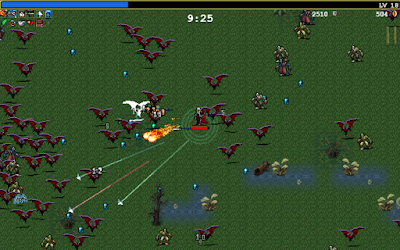Something I've been thinking about recently is the differences between video games and tabletop games, especially in the design or and mechanics behind how the game works with a plurality of players in a single instance, party, or map.
In most co-op video games where the co-op is optional or drop-in and drop-out, the challenge of the game's enemies tend to scale up in damage and/or health in proportion to the number of players currently playing the game. There are exceptions to this; in games where multiplayer is expected or even required, such as an old school MMO, enemies do not scale on purpose as to make grouping up encouraged. Did this concept come around from tabletop games?
 |
| Art @Stephen Andrade |
Notice that in pretty much every monster manual, adventurer module, blogpost, etc. everything is almost always static. In other words, an orc will always have 2 HD of health; the game is not written to "scale" this enemy up or down with the players level or more importantly the number of players.
Now obviously there are practical reasons why this is- why create such bloated rules or math for something so inconsequential? If the DM has a group with only one or two player characters, they could just artificially lower the number of monsters, or grant magic items for a powerful one-shot kind of experience that patches over this issue. No author or publisher is going to want to waste all that space in books for something so fiddly and situational.
I want to make it clear that I am way too young to have been around for the oldschool D&D days. I am not a classic grog playing with Gygax or Anderson. This is 100% conjuncture; but I get the feeling that classic D&D groups may have, at least subconsciously, allowed for more players leading to more power for the purposes of boosting game recruitment.
Once again, let me stress that I know this isn't some genius level marketing tactic done on purpose by old TSR back in the day; those creators were very focused on a totally different kind of game experience then modern OSR games- group dynamics were different. Tabletop roleplaying today tends to focus on smaller numbers of individually controlled characters, where as in the past characters often controlled small armies or squads of units. I don't want to pretend that I know otherwise. But I have a strong feeling that the intentional or unintentional reluctance to change the fantasy space to accommodate the players, both in terms of "dumbing down" for new players or weakening monsters or challenges for small or unprepared groups acts as a strong motivator for game recruitment.
Think about it- a party with five characters will always be inherently stronger then a party of four; even if that last character is weak, like a first level wizard or a poorly rolled character, they are still providing more damage, more carrying capacity, more resources and/or skills in game terms, and another player to bounce ideas off of. Having the game be a "player vs DM" arena with a harsh and challenging world really encourages people to have a strong party- and in this case, more players directly correlate to more strength. It's the classic throwaway line in D&D adjacent media, or nostalgia bait movies and TV shows- "oh you gotta show up for the game this Friday, we're going to fight a cave troll!" or something to that effect often comes up. I wonder how true it really was; either back in the day and now.
As a bonus; how does party size affect the game? These are just my observations when I run games; and may not at all apply to your experiences.
Big Parties
- More Powerful (obviously)
- Individuals are less important / mistakes are punished less as there is a "safety net"
- Generally slower and less stealthy
- More "risk averse" (more people to get browbeaten by)
- More mechanically oriented / requires Caller moreso
Small Parties
- More individually engaging
- Characters are more developed
- Higher camaraderie / victories more earned
- Has more "Epic moments" (individual actions are more impactful)
- More roleplaying oriented





